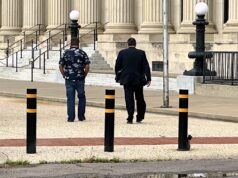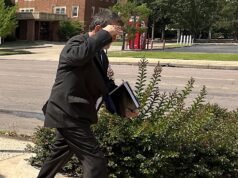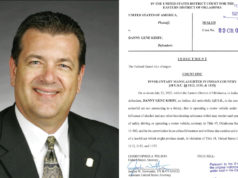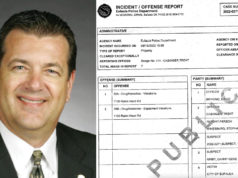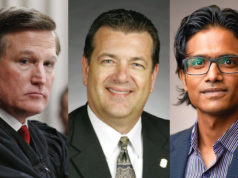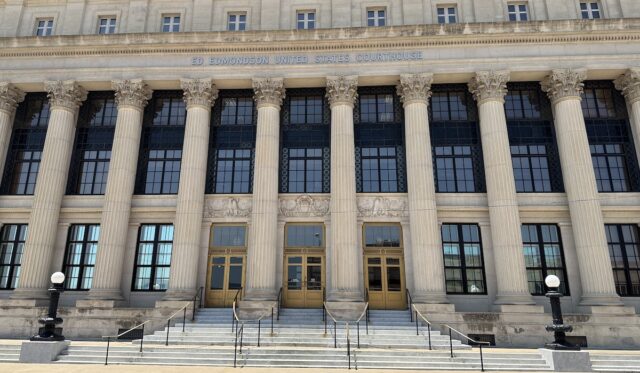
MUSKOGEE — Twice-resigned politician Dan Kirby’s involuntary manslaughter trial began today in federal court and featured emotional testimony from a friend of the victim and questions about the conduct of an Oklahoma Highway Patrol trooper who investigated the scene of Kirby’s fatal motorcycle wreck that killed his girlfriend.
Kirby, who resigned from the Oklahoma Legislature in 2017 and from the Eufaula City Council in March, is charged with involuntary manslaughter in the death of Sheryl Bichsel, who was thrown from the motorcycle he was driving July 23, 2022, after a night of partying.
Because Kirby is a citizen of the Muscogee (Creek) Nation, he is being tried in U.S. District Court for the Eastern District of Oklahoma. Bichsel was a citizen of the Choctaw Nation. District Court Judge John F. Heil III is presiding.
According to court documents filed in anticipation of the trial and testimony Monday from an Oklahoma Highway Patrol trooper, Kirby declined to complete a field sobriety test the night of the crash after he was unable to comply with the Horizontal Gaze Nystagmus portion. Kirby later gave blood at a Muskogee hospital for a toxicology analysis that showed a variety of chemicals present in his system.
Court documents and Garry Metcalfe, the Oklahoma State Bureau of Investigation criminalist supervisor who analyzed Kirby’s blood sample, said that while his blood alcohol content was only 0.028, below the legal limit, the OSBI toxicology analysis also found a combination of other narcotics in his system, including unspecified amounts of amphetamine, marijuana, tramadol, oxycodone and a pair of anti-depressants — citalopram and trazodone.
To achieve a conviction on Kirby’s involuntary manslaughter charge, the government must unanimously convince a jury that, beyond a reasonable doubt, the combination of drugs and alcohol in Kirby’s system made him “incapable of safely driving or operating a motor vehicle.” While the legal limit of alcohol is defined at 0.08 BAC, there is no defined limit for the other substances found in Kirby’s blood.
Jurors hear from three witnesses Monday
Following a brief jury selection process, the trial of Dan Kirby began midday Monday.
To make its case, the government called Metcalfe, OHP trooper Charles Epley and Janann Geis — a friend of Kirby’s and Bichsel’s — to testify.
After Metcalf’s testimony regarding Kirby’s blood analysis, Geis, who witnessed the crash after spending the evening with Kirby and Bichsel, provided emotional testimony about the night of her friend’s death.
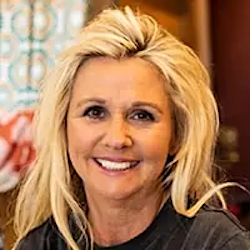
“She loved to ride,” Geis said moments before crying at the sight of Bichsel’s photo as it was shown to the court.
That Saturday night, Geis, Kirby, Bichsel and Steven Hunt, another witness, were spending the evening together drinking and riding their motorcycles.
According to Geis’ testimony, Kirby drove Bichsel on the back of his motorcycle while Hunt and Geis followed them in a car to Kirby’s dad’s house. There, they retrieved Bichsel’s motorcycle for Hunt to drive with Geis riding on the back.
When Bichsel’s motorcycle would not start, Kirby, Bichsel and Geis attempted to push start it with Hunt driving. When it finally started running, Kirby fell and sustained lacerations, Geis said. Prosecutors, who noted in their trial brief that Kirby had cut his face, emphasized to the jury that Kirby was the only one who fell.
Once the group had doctored Kirby’s wounds from his fall, they rode to the Fountainhead Marina and Grill. Geis said Kirby drank two beers and smoked from a marijuana dab pen once.
“We didn’t like to drink and drive,” Geis said of the group. “We wanted to ride, we didn’t want to get drunk.”
As Geis began to explain what happened when the group left the bar, she paused multiple times to cry.
With Bichsel on his motorcycle, Kirby drove in front and Hunt followed with Geis on Bichsel’s motorcycle. The two vehicles took a curve on the road. Geis said that when she came around the curve, she saw Kirby and Bichsel off the road and turning to get back on it.
“When he went to get back on the road, the rear end went straight up — I refer to it like a bucking bull,” Geis said.
She said Bichsel was thrown from the bike “clear across the road.”
“Her chest hit first and her head just went ‘clunk,'” Geis said.
When she went to check on Bichsel, who was not wearing a helmet, Geis said she found her friend unresponsive. Kirby was wearing a helmet.
“Dan [came] over and said, ‘Sheryl be OK, be OK, I love you, be OK,'” Geis recalled.
Defense casts doubt on Kirby intoxication
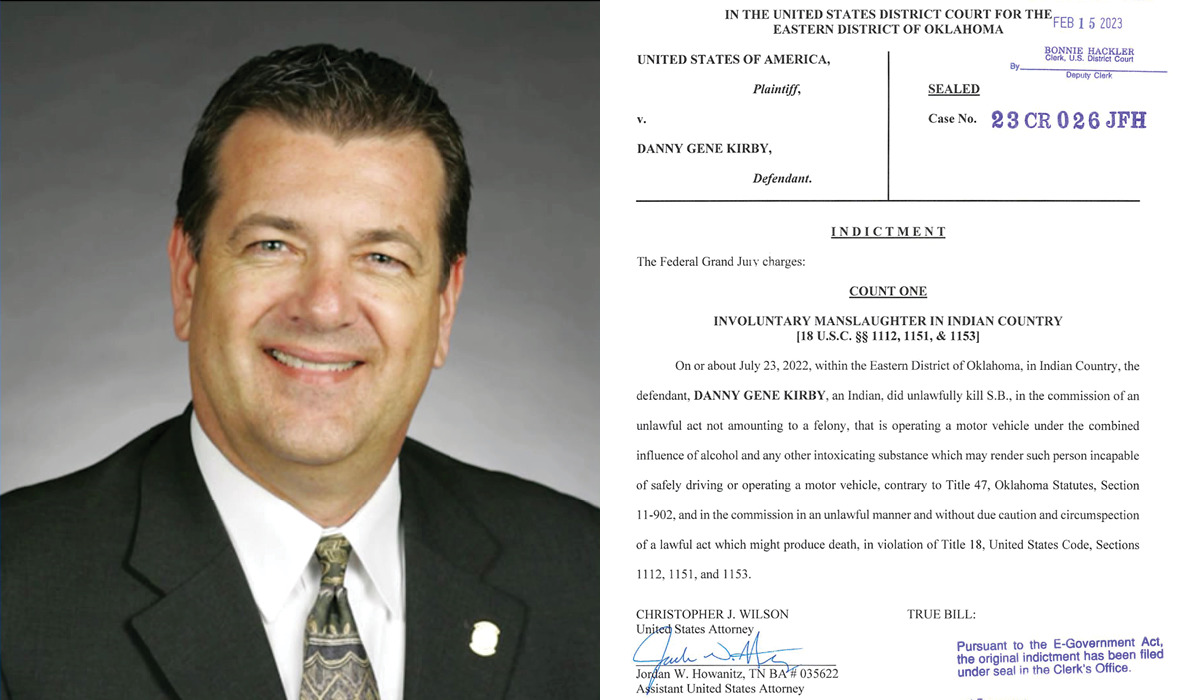
The government’s final witness Monday was OHP Trooper Charles Epley, who conducted the field sobriety test on Kirby. Jurors were shown videos of Epley administering the field sobriety test attempts on Kirby, with both the prosecution and the defense attempting to suggest their own conclusions.
Epley arrived on the scene after EMS and local police. He said Kirby refused medical treatment. Epley did not arrest Kirby that night, although he did transport Kirby in handcuffs to have his blood drawn. Epley said his “job was to gather information” that evening.
Epley described Kirby as sweaty and nervous, and he said that Kirby kept fidgeting and rambling as he tried to talk to him — all evidence of someone being under the influence of narcotics, Epley said.
At one point during the encounter, Epley received a phone call from an off-duty trooper to check on Kirby. Epley said it was very unusual for him to receive a phone call from an off-duty trooper while he was on duty concerning a case he was handling. Epley said the phone call made him “uncomfortable.”
Epley told the court that he attempted to complete the HGN test with Kirby three times, but that Kirby was unable to follow his instructions on each attempt. Kirby then declined to continue with the field sobriety test. After that, Epley drove Kirby to the Muskogee hospital to draw his blood.
Before the trial, Kirby’s lawyer filed a motion to suppress Kirby’s blood toxicology report, arguing the blood was drawn without Kirby’s consent as part of “medical treatment” he thought he was receiving at the hospital. That motion was denied by the court.
During the trial Monday, John Campbell, Kirby’s lawyer, attempted to show the jury that Epley never asked for Kirby’s consent to draw blood. Epley, however, insisted that he had informed Kirby that they were going to the hospital for the sole purpose of drawing his blood, not for medical care.
In cross examination of each witness, Campbell attempted to cast doubt on any assertion that Kirby was impaired.
Although Campbell asked few questions of Geis, he succeeded in getting her to tacitly admit that she did not think Kirby was impaired the night of the crash.
“If I had thought [Kirby] was very intoxicated or drunk, no, I wouldn’t have let [Bichsel]” get on the motorcycle,” Geis said.
Campbell was much more aggressive in his cross examination of Epley, implying that if the trooper had really believed Kirby to be intoxicated, he would have arrested him that night.
Campbell also implied with his questioning that the road itself was difficult to navigate with poorly marked lines that would be tough to see in the dark.
Epley, for his part, responded that he personally did not have difficulty navigating the road that night, which was his first time driving on it.
Prosecutors also made sure to note that Hunt and Geis made the turn where the crash happened with no difficulty that night.
Campbell, meanwhile, played a different angle of the dash cam footage showing Kirby’s field sobriety test, which depicted Kirby watching ambulances rush past the two men.
Campbell used the video to argue that Kirby may have failed the HGN test because he was distracted by paramedics dealing with Bichsel, which he said could have been in Kirby’s line of sight.
Dan Kirby trial continues Tuesday
According to prosecutors’ trial brief filed last week, the government intends to call Jarrad Wagner, a forensic toxicologist, to the witness stand Tuesday. In one of his two reports on the incident, Wagner said “the presence of multiple impairing substances create the likelihood that the motorcycle operator was impaired at the time of the fatality crash.”
Kirby’s defense team intends to call its own expert witness, Craig Stevens, a pharmacologist at Oklahoma State University. While both sides filed pre-trial motions to exclude the other party’s expert, the judge ruled to allow all testimony from Wagner and some testimony from Stevens, barring him from opining on “legal conclusions, specific laws, legal terminology, or [Bicshel’s] helmet use.”
Owing to another pre-trial ruling, Kirby’s defense team will be allowed to present evidence that an analysis of Bichsel’s urine showed a blood alcohol content between 0.07 and 0.1, which would be near or above the legal limit. Prosecutors initially tried to exclude that evidence, but they later withdrew their motion to do so. Kirby’s team could try to argue that Bichsel’s death was a result of her own intoxication and subsequent decision not to wear a helmet.
On Monday, prosecutors questioned Geis about Bichsel’s helmet use.
“[Bichsel] didn’t like to wear [a helmet] because of her hair,” Geis said, adding that “her hair always looked so good.”
The government also intends to call Hunt to the stand, according to its trial brief.
If convicted, Kirby could receive a fine and up to eight years in prison. The trial — which is estimated to run through Wednesday — does not mark the first time he has been in the public eye for a scandal.
In 2017, then-Rep. Dan Kirby (R-Tulsa) resigned while facing expulsion from the Oklahoma House of Representatives for sexual harassment allegations. Undeterred from a desire to hold public office, Kirby returned to his hometown of Eufaula and won election to Ward 4 of the Eufaula City Council in April 2021.
He resigned from the Eufaula council seat in March, about a month after being indicted by a federal grand jury for Bichsel’s death.











